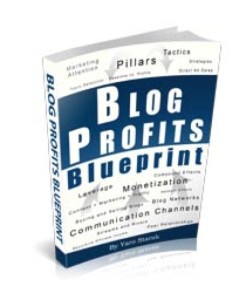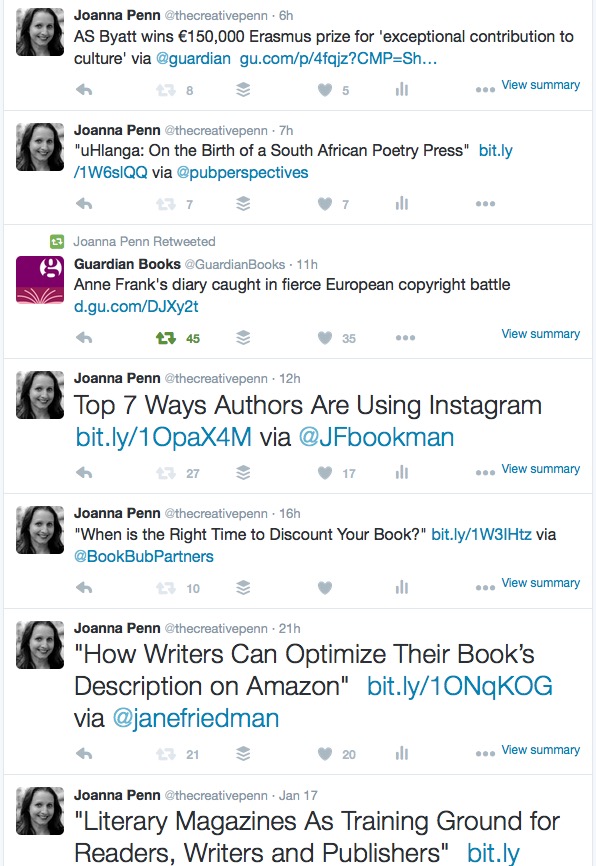OLD POST ALERT! This is an older post and although you might find some useful tips, any technical or publishing information is likely to be out of date. Please click on Start Here on the menu bar above to find links to my most useful articles, videos and podcast. Thanks and happy writing! – Joanna Penn
I've been blogging for seven years now, and this site is the engine behind my six-figure business.
 Book sales account for around 50% of my income, but the other 50% comes from the products and services offered on and around TheCreativePenn.com. [Income breakdown here.]
Book sales account for around 50% of my income, but the other 50% comes from the products and services offered on and around TheCreativePenn.com. [Income breakdown here.]
These days, ‘blogging' is just one part of content marketing, which is essentially using free, useful, entertaining or inspirational content to attract people to your site with the intention that they may eventually buy a book or a product.
But many people jump into blogging too fast without learning what’s important and how to do it effectively.
They waste time and energy and end up complaining about lack of traffic, sales or comments. This is particularly pertinent for authors, because we only have time for a certain number of words per day!
Blogging is a completely different skill to writing a book.
It's a form of copywriting, with the intention that the reader will take action rather than be a passive consumer, as they are for a book.

Here are some of the main things that I see authors getting wrong on their blogs and how to fix them.
(Mistake 1) Using terrible headlines, which means people won't click or open or read any further
I share a lot of articles on Twitter which means that I skim a lot of content every day. Sometimes I find great articles but I have to edit the headline to make it more clickable.
Your headline should not be obscure or overly clever. It should be clear about the benefit to the customer.
Think about what a potential reader of your blog will type into Google or what might catch their eye on social media.
What are some of the words your customer will use? This is exactly the kind of keyword research that you should be doing about your book, so just take it a little further into the realm of a headline.
(Mistake 2) Not using enough images
Think about scrolling through your Facebook feed. What catches your eye?
It's not blocks of text any more, it's more likely to be images.

Most of the social sharing sites favor eye-catching images and many of the sharing tools like Bufferapp now automatically pick images from a post.
When you scan through a blog post as a reader, you use the images and sub-headings to decide whether to read certain sections.
So, it's important to use images when you blog, and there are lots of sites you can find them on.
For free images, you can search for Creative Commons options e.g. on flickr.com. All my own images on Flickr are Creative Commons. Check the type of CC license on the photo and make sure you attribute the creator in your post.
You can also buy images from royalty-free sites like bigstockphoto.com and sometimes these are easier because it's quicker to find great quality images.
Of course, you can use your own images, and perhaps that is the best option, because they are more personal and always original.
Then, you can use a tool like canva.com to edit the images and add text, as per the example at the top of this post.

We all know the importance of an amazing book cover in attracting a reader, so it's clear that each blog post will need a similar type of attractive image. So, do your blog posts and pages have attractive images on?

(Mistake 3) Not being mobile-friendly
Increasingly, people access the internet on their mobile devices, so your site needs to be optimized for whatever device people are using to find it.
More recent blog themes are responsive, changing size depending on the device used to access them.
But many authors are still running old themes, or even using website design that makes it very hard to upgrade and make the site mobile-friendly.
Pick up your phone (or borrow someone else's) and go to your site right now.
Is it optimized for mobile? Can someone sign up for your free ebook on their device?
If the fear of technology change is stopping you from updating your site, it's time to bite the bullet. Because Google now penalizes websites that are not mobile-optimized so this is increasingly important.
Personally, I use Studiopress for my WordPress design, but there are lots of options out there. Just make sure you choose a responsive theme. [Here's my tutorial on building your own author website.]
(Mistake 4) Not using enough white space
When was the last time you read every single word of a blog post?
In fact, I'm pretty sure that you're skimming this article! Most web browsers do, and that's fine.

We all have limited time, and the best way to consume articles like this is to skim over the highlights.
But the reader can only do this if the article is designed properly, with enough white space and segmentation of content.
This is why list posts perform so well. It's clear which aspects to pay attention to.
So make sure you use formatting to split out elements of your article.
This includes subheadings, putting aspects in bold and leaving a lot of white space, as well as using more images throughout the post to catch people's eye as they scroll down.
(Mistake 5) Thinking that it's all about you
One of the biggest issues with author blogs is that they are entirely self focused.
Yes, of course, you have to share personal information in order to connect with readers. That will build your unique voice and a personality that people will remain interested in over time.
But you also have to consider why they are there in the first place.
If you have a blog like this, which drives a non-fiction business, it's better to always focus on what the customer wants and needs.
For example, instead of writing a blog post about “the struggles I have with my latest novel,” I could turn that around and write one on “How to overcome struggles with your latest novel.”
Changing ‘I' to ‘you' shifts the focus onto the reader/customer.

Many articles written by authors who haven’t studied blogging are rambling and overly personal without actionable advice or information for the reader.
It's not surprising when they don't get much traffic or traction.
(Mistake 6) Creating only ephemeral content
When I first started blogging, I was under-confident about what to share. After all, who was I to talk about publishing and writing?
So I used to do link roundups of things I found useful. Here's one example from Dec 2008. This is the type of post I still see people sharing, but there are some huge problems with this type of post.
- It's obsolete really fast – so unless you are a news focused site posting new stuff several times a day e.g. The Passive Voice or InkBitsPixels, it's not a good use for your blog
- It takes people away from your site because once they click, they're over at someone else's place and may never return
- It doesn't represent your own opinions or ‘voice' on the topic. There is nothing memorable about you when you share links without some kind of analysis
- Pretty soon, many of those will be ‘bad links' as so many sites disappear over time.

Your blog should be full of your content, original pieces in your voice.
It should ideally be content that will last.
This can be described as ‘pillar content,' which is covered in Yaro Starak's Blog Profits Blueprint. A good example of pillar content for this site would be a post about essential grammar (these are always popular!) or how to write a non-fiction book. This type of article doesn't age.
Posts about publishing and book marketing, as I know myself, need updating over time because things change.
(7) Not deciding on WHY you are blogging
Are you writing articles and guest posts because someone said that was the thing you had to do?
What are you actually achieving with your actions?
As authors we have a certain number of words per day and we all have a limited amount of time. We have to choose very carefully how to use those words. Would they be better used to write a book?
Of course, I love blogging and I've written over 1500 articles over the last seven years, most of those on this site, but many across the blogosphere.

I have a business based on my writing and I make a full-time living this way. That was always my intention and everything I write drives towards that goal.
With each piece of content you create, consider why you are doing it and how it helps you to reach your goal.
Will this article attract people to your email newsletter? Will it send people directly to your books? Will it build your authority in your niche?
Of course, writing for the sake of writing is brilliant and I'm certainly a fan of blogging for helping others, connection and self-expression. I attribute blogging with helping me relax my writing enough to write fiction after years in a corporate job.
But if your definition of success relates to income and book sales, then you have to consider how blogging (and everything else) fits into that plan.
Hopefully that gives you some ideas about what you can improve with your author blog.
And if you want to learn how to blog in order to build a business online, then check out Yaro Starak's Blog Profits Blueprint. I learned from Yaro and his influence is all over this site – from the podcast and my pillar content, to the idea behind my Author 2.0 Blueprint – so I can personally recommend him. He has updated everything for the latest tools, even though the underlying principles remain the same. Click here to check out the free Blog Profits Blueprint.
If you have any questions or lessons learned from your author blogging experience, please do leave a comment below and join the conversation.


All of these are exceptional points that make me rethink things I might need to change on my blog. Much appreciated for the tips.
As Robert already said, this is an exceptional post – with some truly terrific tips that definitely make me reconsider my past blogging experience… and what I hope to gain from blogging in the future. Thanks, Joanna!
A quick message to thank you for sharing this information. Timing is just perfect as I’m just starting my blog. Yaro Starak’s Blog Profits Blueprint sounds promessing. Neil Patel is another guy I like to follow for building a platform. You can check him at http://www.NeilPatel.com
So my question, that no one seems to answer, is: what about pre-published fiction writers who don’t want to be yet another book reviewer, or blog about the daily ups and downs of writing? I never know what to blog about, other than the odd trip or retreat. I’m not an expert, although some of my research has led to blog posts. What do you suggest fiction writers blog about?
Hi Kathryn, if you want to blog at all, and it’s certainly not mandatory, then your research or other things you enjoy that your readers might also enjoy e.g. a horror writer I know talks about movies he enjoys and music. But many fiction writers DON’T blog, they use their words for writing books.
I struggle with this same issue as an independent editor. I’ve been chastened more than once by clients and potential mentors for not having a blog. So, I created a blog. But because it wasn’t a self-motivated choice, but rather something I did to meet another person’s expectations, I never felt 100% convinced I had anything to blog about that would be relevant or confidence-boosting to potential clients. Am I a good editor? Yes. Can I write as well? Yes. Can I blog about why you should hire me? Sure. But do you–does anyone–really want to read about all the reasons why I think I’m so great?? No way.
That said, I sometimes wonder if the number one mistake would-bloggers make is worrying so much about what to blog, that they don’t blog at all. After all, if you’ve got content that isn’t working for you, you can always improve it. If you don’t have the content… well, then you don’t have much to work with. But maybe that’s just the editor in me talking. Write first, edit/improve second.
In my case, what I’ve finally decided to do is rework my blog so that it functions more like a traditional website, with my blog being just one component of that sight. This has freed me up mentally, and I already have several new ideas for what I can do with it–most of it just for fun. Hopefully, it won’t take me too long to get the hang of things and I can actually start sharing and promoting my site in the near future.
Best of luck to you, Kathryn! And thank you Joanna for this article and the many other wonderful resources you’ve sent our way!
My understanding from your podcasts and others, is that, those of us who have yet to publish our first novel need to build our reader base. It was stated that doing this before publishing ensures we will have sales and reviewers. However, as Kathryn has said, it is difficult to follow your advice and others to build a blog/website and gain those subscribers/email lists.
I love your podcasts and posts btw.
I found this post very helpful. I’m an unpublished writer and I have just starting blogging as a part of my author platform. I have written my posts but didn’t know what to do with them to make them better. I should have read this first.
Many thanks!
It’s hard to admit, but I’ve been guilty of ALL of these mistakes.
One of the tougher ones for a writer is finding good images to use. As much as I don’t enjoy graphic design, lately I’ve been putting more time into it so that the articles I write have a nice visual appeal. I love Unsplash.com for great free photos. I’ve also been using Pixelmator, an affordable program for Mac that is like a poor-man’s photoshop. It has everything I need, though 🙂
Thank you for the very valuable information. It should come in very handy as I’m now just starting my blog to drive traffic and exposure for my upcoming fantasy epic.
I honestly clicked on this article thinking it was going to be the same, repeated, trite blogging tips. But here you offered a few good gems about the aesthetics and purpose of blogging for authors. I’m glad that my own blog stands up to most of these tips. Only problem, I wish I blogged a heck of a lot more, but then again, independent writing is not my primary income. Fortunately I (also) love my other job as an Army writer/journalist.
I like how you bolden certain sentences as pull quotes. I may start doing that.
I’m keen to start bloggin, but I’m having an IDENTITY CRISIS! I’ve published 2 books on KDP using a pseudonym, one aga-saga, one self help. I also have 2 early drafts on the go, one post-apocalyptic fiction, one teenage thriller, which I had thought to publish under different pen-names. Should I roll all these brands up under one on-line persona, or keep them completely separate?
A great article. I wish I was brave enough to do all you suggest. It makes a good reference piece and I’ll try to hunt out images because you are absolutely right about those.
Good solid, helpful advice (as always). I’m very sorry that I can’t make your Auckland workshop!!!